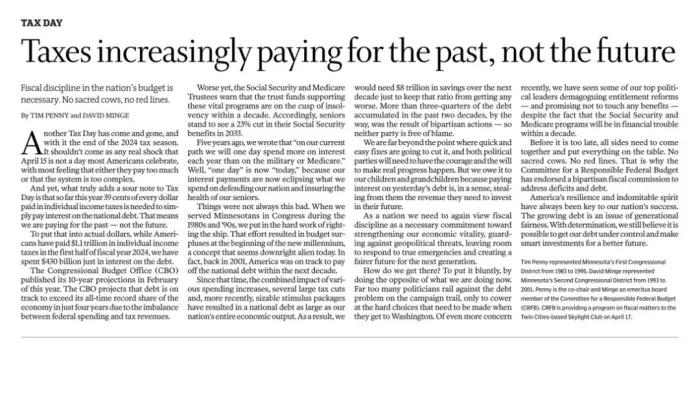Principles for the Fiscal Year 2018 Budget Resolution
The Congressional budget resolution is a guiding document that should establish the nation’s budget priorities, the approach to financing them, and a plan to ensure the nation is on a fiscally responsible track. We recommend that Congress adhere to the following principles when crafting a budget resolution:
Set a meaningful fiscal goal with a plan to meet that goal
- The fiscal goal should, at a minimum, put debt on a downward path as a share of the economy over the ten-year window and beyond.
- Set out a plan to meet that goal, free of gimmicks or unrealistic assumptions.
Include a plan to control the growth of mandatory spending
- Include significant and achievable savings targets to slow the growth of Medicare, Medicaid, and other entitlement programs, along with credible examples.
- Include reconciliation instructions for all mandatory savings assumed in the resolution.
Provide for fiscally responsible tax reform
- Include reconciliation instructions for pro-growth tax reform that is preferably revenue-generating and at least revenue-neutral relative to current law.
- Devote any increased revenues from dynamic growth to deficit reduction.
Set responsible, achievable, and enforceable discretionary spending levels
- Set realistic discretionary levels, offset by spending cuts if above “sequester levels.”
- Limit Overseas Contingency Operations (OCO) spending based on needs related to military operations for the war on terror, and establish criteria for OCO spending.
Enforce the PAYGO requirement that legislation not add to the deficit
- Require full offsets for any bill that reduces revenues or increases mandatory spending so that it does not add to the deficit.
- Maintain and strengthen PAYGO and other rules prohibiting legislation that would increase the deficit over the medium or long term.
Rely on credible and realistic assumptions
- Use economic assumptions based on Congressional Budget Office estimates.
- Require “current law” baseline rules for evaluating costs of legislation.
- Do not rely on large, unspecified spending cuts.
Improve the budget process and budget enforcement
- Ensure strict enforcement of spending and revenue levels in budget resolution and make it more difficult to waive budget limits.
- Strengthen prohibitions of fake savings and other budget gimmicks.
Tags
What's Next
-
Image

-
Image

-
